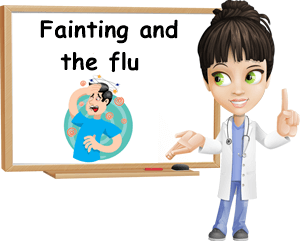Influenza, or the flu, is a viral infectious disease of the respiratory system. It is caused by a virus, just like the common cold. However, influenza is different from the common cold in that it is caused by other types of viruses called influenza viruses and is a more severe respiratory infection with often debilitating symptoms. One of these more serious symptoms is fainting. Fainting is common with influenza, but usually only occurs in more serious cases. Just like flu symptoms tend to occur suddenly, so does fainting come about unexpectedly.
But fainting is not a direct symptom of the flu. It’s rather a result of the respiratory infection weakening the body in order to deprive it of resources and allow the virus to take over. Usual flu symptoms include high fever alternating with chills, cough, sneezing, runny nose followed by nasal congestion, sore throat, quite severe body aches, headaches, fatigue and malaise. When these symptoms occur all together in a short span of time, most people find it difficult to cope with them and make the mistake of not eating and not drinking water. This weakens the body and results in more serious side effects such as dizziness followed by fainting, or worse.

My experience with a bad flu virus in early 2017 has taught me how to best deal with the flu in general and prepared me for any flu virus that may come my way in 2018 and after that. What I learnt was that the secret to avoiding dizziness and fainting from the flu is knowing what could cause them in the first place and counteract with good symptoms management and adequate treatment. And if at any time symptoms get worse, the first thing to do is call a doctor and get medical assistance. Because the flu can be a life-threatening medical condition if not managed properly. Find out below which are the main reasons why you may feel lightheaded, dizzy and faint when you have the flu.
Causes for fainting with the flu
1) Dehydration. The flu is characterized by fever, in severe cases high-grade fever. And fever is accompanied by sweating, a mechanism meant to help the body maintain a normal temperature. But sweating also means you lose a lot of fluids and risk becoming dehydrated. Dehydration also means a low blood volume (not enough water in the circulatory system) and this leads to low blood pressure and fainting (see article and low blood pressure: causes, symptoms and treatment). The side effects of dehydration are most likely to occur when attempting to sit or stand, two actions that require sufficient blood volume for good blood flow.
2) Low blood sugar (hypoglycemia). The number one mistake most people with the flu make is not eat. This deprives the body of essential vitamins, minerals and other nutrients required to keep the immune system functioning optimally and fight the infection. When you don’t eat for several hours, your body uses up the sugars in the blood and when blood sugar levels drop below a certain limit, your body no longer has energy to keep you up and about. Depending on how low your blood sugar gets, you may experience various symptoms, from weakness in the arms and legs, tingling sensation, lightheadedness, dizziness, tunnel vision and fainting.

Anemia and the flu. Being anemic means that you are even more likely to experience fainting when you are sick with the flu. This is because your body is already deficient in key-nutrients like iron, vitamin B12 or folic acid and not eating when you have the flu accentuates these already pregnant deficits.
Diabetes and the flu. Diabetics are advised to carefully manage influenza symptoms. Being diabetic means your body doesn’t make good use of insulin and you are more likely to experience blood sugar fluctuations, especially when you don’t eat. And this implies an even greater risk of fainting from the flu.
3) Medicine side effects. Every medicine has its side effects and lightheadedness, dizziness and fainting are quite common for most of them. Even flu medicine, cough medicine and nasal decongestant sprays can cause fainting. If you have been prescribed antibiotics for a bacterial infection secondary to your influenza, make sure you eat and stay hydrated because antibiotics are strong medicine and can easily lead to loss of consciousness. Other medication with the same side effect includes blood pressure medication and allergy medication like antihistamines. So consider any existing health issues and the prescribed treatment for it when you are sick with the flu. Taking paracetamol for fever can cause liver problems and potentially lead to fainting.
4) Secondary infections are complications of severe influenza episodes. These include bacterial infections, bronchitis, pneumonia or ear infections and others. And considering a flu virus can weaken even the healthiest body to the point of needing bed rest, a secondary infection could simply be too much for you to handle and result in fainting. If your flu symptoms do not improve in a week or get worse with every passing day, see a doctor as soon as possible.
5) Exhaustion. One of the main symptoms of influenza is feeling tired. If you don’t rest, you will easily become exhausted and your body will shut down, causing you to faint in order to be able to focus on fighting the infection without you wasting its energy. Any activity takes away precious energy needed to power the immune system, even walking or sitting. Even a severe cough that keeps you from sleeping can result in exhaustion and eventually lead to fainting.
Risk categories for influenza complications. Children, the elderly, people suffering heart failure or other serious cardiovascular conditions, asthma, immunodeficiency, over-exhaustion, pregnant women, diabetics are most at risk for side effects such as fainting and should not be left alone.
Tips and solutions
How to prevent flu dizziness and fainting? Here are 7 great solutions for influenza side effects:
1) Drink liquids. Whether it’s plain water, flavored water (with lemon juice or other citrus fruits, ginger or berries), sparkling water, herbal teas, sports drinks with electrolytes and no caffeine (remember they are different from energy drinks), chicken soup, broth, fruit juices, vegetable juices or rehydration solutions, they all help prevent dehydration and fainting from the flu. Avoid coffee and caffeinated beverages like green tea, black tea, white tea, energy drinks and fizzy drinks rich in sugar which dehydrate.
2) Eat well. The best foods to eat when sick with the flu are:
– Chicken soup (anti-inflammatory properties and source of protein, good for dehydration)
– Bone broth (similar benefits)
– Foods rich in vitamin C to boost immunity
(bell peppers, strawberries, kiwifruit, acerola cherry etc.)
– Foods rich in iron to support white blood cell production
(chicken meat, eggs, beans and green leaf vegetables)
– Foods rich in B vitamins to give your energy and vitality
(eggs, meat, legumes)
3) Consider existing medical issues and the medication your are taking for them. Know how your medication may interact with any flu medicine you may be considering taking and see your doctor at the first sign of side effects. For example, you can replace regular nasal decongestants with a saline solution-based nasal spray to avoid side effects and still get relief for a blocked nose (see article on side effects of nasal decongestants).
4) Don’t be alone. People sick with the flu should always have someone by their side, not only to help them with daily activities they may be too weak to perform, such as cooking, getting food or going to the bathroom so they don’t faint, but also for assistance in case there are complications and there is need for medical help. Anyone with an existing medical condition such as heart problems, diabetes, asthma or allergies, immune system deficiencies or disorders, children and the elderly should not be left alone. In their case, experiencing fainting from influenza is both more likely and more serious.

